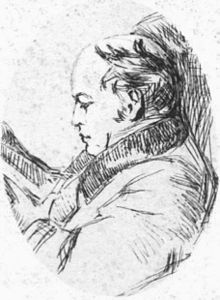Julius Mohl
Julius Mohl (born October 25, 1800 in Stuttgart ; † January 4, 1876 ) was a German orientalist .
origin
His parents were the Württemberg jurist and politician Benjamin Ferdinand von Mohl (1766–1845) and his wife Louisa Friederica Autenrieth (1776–1843). His mother was a sister of Johann Heinrich Ferdinand Autenrieth , Chancellor of the University of Tübingen. He had other brothers among them: Robert von Mohl , Moritz Mohl and Hugo von Mohl .
Life
Mohl first studied theology in Tübingen, then in England and Paris under Silvestre de Sacy and Jean-Pierre Abel-Rémusat oriental languages (namely Persian, Arabic and Chinese) and in 1826 received an extraordinary professorship in oriental literature in Tübingen, but spent the next Years mostly in Paris , London and Oxford with scholarly research, the fruits of which were the fragments relatifs à la religion de Zoroastre (Paris 1829), worked on with Olshausen . Then he published two older Latin translations of Chinese religious books by learned Jesuits : Confucii Chi-king, sive liber carminum, ex latina P. Lacharme interpretatione (Stuttgart 1830) and Y-king , antiquissimus Sinarum liber, ex interpretatione P. Regis (das . 1834–39, 2 volumes), but from now on turned exclusively to the study of Persian . Commissioned by the French government to edit and translate Shâhnâme von Firdusi for the "Collection orientale", he dismissed him in Tübingen in 1834 and moved entirely to Paris, where he was naturalized. That magnificent work appeared in six folio volumes (Par. 1838–66), including a seventh (completed by Meynard, 1878) after Mohl's death. The French translation was specially edited by his widow in seven Duodec volumes in 1876.
As secretary, later president of the Asian Society in Paris, Mohl developed a great activity. His "annual reports" were particularly appreciated; The Journal asiatique also owes him many excellent articles. In 1844 he was appointed a member of the Academy of Inscriptions in place of Eugène Burnouf , in 1847 professor of Persian at the Collège de France and in 1852 appointed inspector of oriental printing in the imperial printing house. The excavations of Botta in Chorsabad were undertaken at his instigation and according to his plan; in relation to this he published: Lettres de Mr. Botta sur les découvertes à Khorsabad (1845). In general, Mohl was tireless in promoting scientific endeavors, and his salon was a gathering place for scholars and literary celebrities during the Second Empire .
Julius Mohl died on January 4, 1876. His reports to the Asiatic Society appeared after his death under the title: Vingt-sept ans d'histoire des études orientales (edited by his widow, 1879–80, 2 vols.). See Simpson, Julius and Mary M., letters and recollections (Lond. 1887).
literature
- Carl Gustav Adolf Siegfried: Mohl, Julius . In: Allgemeine Deutsche Biographie (ADB). Volume 22, Duncker & Humblot, Leipzig 1885, pp. 57-59.
| personal data | |
|---|---|
| SURNAME | Mohl, Julius |
| BRIEF DESCRIPTION | German orientalist |
| DATE OF BIRTH | October 25, 1800 |
| PLACE OF BIRTH | Stuttgart |
| DATE OF DEATH | January 4, 1876 |
